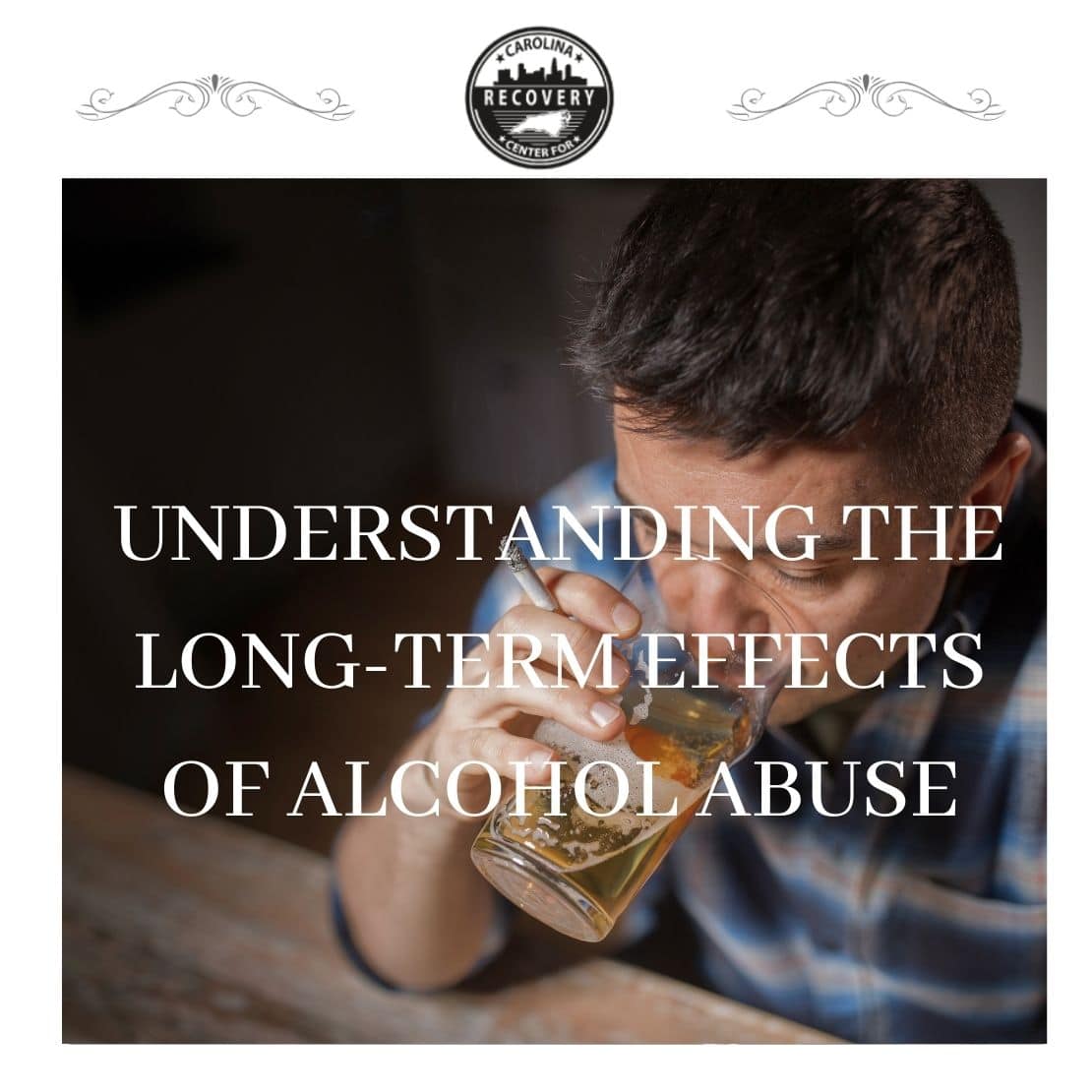Understanding the Long-Term Effects of Alcohol Abuse

Medically Verified: 2/1/24
Medical Reviewer
Chief Editor

All of the information on this page has been reviewed and verified by a certified addiction professional.
Alcohol use is common and widely accepted throughout the United States. Many people drink alcohol during celebrations, meals, and social events. Recent research from the Centers for Disease Control and Prevention (CDC) showed that most adults–over 66%–reported consuming alcohol in the previous year.
People who want to drink have no trouble finding alcohol. It is easy to find, legal to purchase, and generally inexpensive. While alcohol is legal and readily available, it is not without risk. Drinking heavily puts people at immediate risk of accidents, risky behavior, and more. Those who drink heavily for a long time may face serious, sometimes life-threatening harm to their health and wellbeing.
Reach out to the Carolina Center for Recovery team to explore our alcohol abuse treatment programs or find support during recovery.
Understanding the Long-Term Effects of Alcohol Abuse
Excessive drinking can cause unwanted effects. Cardiovascular problems, such as increased blood pressure, increased risk of stroke, and irregular heartbeat, can occur after just one episode of heavy drinking. People who drink excessively are also at elevated risk of being involved in an accident, being the victim of a crime, and overdosing.
Heavy and prolonged alcohol use is associated with health complications that could lead to early death. Here are some of the most significant long-term effects of alcohol.
Long-term effects of alcohol on the brain
Long-term alcohol use can damage the brain. In the short-term, heavy drinking can lead to memory problems and blackouts. But the impact of alcohol increases over time, leading to significant damage with real consequences to your ability to function.
Chronic alcohol misuse can deplete your brain’s supply of thiamine, a vitamin essential to the health and functioning of your brain. Low thiamine levels can result in Wernicke’s encephalopathy, which has symptoms that include:
- Severe confusion
- Loss of coordination
- Nerve paralysis affecting eye movements
Most people who develop Wernicke’s encephalopathy also develop Korsakoff’s psychosis. This severe condition, known as Wernicke-Korsakoff syndrome or “wet brain,” causes severe memory problems, including the inability to make new memories.
Heavy, chronic alcohol use can also lead to psychological and physical dependence by altering how the brain works. People may develop intense cravings for alcohol and other symptoms that make it nearly impossible to stop drinking when they want to.
Long-term effects of alcohol on the cardiovascular system
There has been a lot of back and forth about the impact of alcohol on the heart. Some research suggests that an occasional glass of red wine may decrease the risk of heart disease, and other medical professionals believe there is no healthy amount of alcohol consumption.
What is clear, however, is that heavy drinking–defined as eight or more drinks for women and 15 or more for men– is linked to certain cardiovascular complications, including:
- Cardiomyopathy–a disease of the heart muscle
- Stroke
- Arrhythmias
- Heart failure
- High blood pressure
Long-term effects of alcohol on the liver
The health of your liver is critical to your overall well-being. The liver is one of the most important organs because it removes toxins from the body, aids in digestion, and helps to regulate metabolism. Heavy drinking can damage your liver cells and enzymes, leading to serious health consequences.
Liver disease develops in stages, beginning with fatty liver. Heavy drinking causes fat deposits to form on the liver, which can lead to liver enlargement. While fatty liver can happen without symptoms, some people may feel fatigued.
Next, alcoholic hepatitis develops. This serious form of liver inflammation can cause liver cells to die. Scarring and fibrosis may also occur. People with alcoholic hepatitis may have symptoms that include:
- Pain
- Weakness
- Nausea
- Loss of appetite and weight loss
- Jaundice
- Distended abdomen
- Fever
Fluids begin to build up in the system as the liver loses the ability to function properly.
Finally, alcoholic cirrhosis develops. This final progression of liver disease results in heavy scarring on the liver, resulting in loss of function. Symptoms of liver cirrhosis include:
- Shrunken, scarred liver
- Spleen enlargement
- Extreme jaundice
- Abdominal fluid retention
- Confusion
- Intestinal bleeding
Some liver damage, including scarring and cell death, can be reversed if the person stops drinking. However, some damage may remain even if a person abstains. Long-term alcohol abuse is believed to increase the risk of liver cancer.
Long-term effects of alcohol on the GI system
Heavy alcohol use can cause inflammation throughout your digestive and GI systems, leading to problems that include:
- Inflamed stomach lining that can cause nausea, heartburn, bloating, and a heavy or full sensation
- Esophageal swelling and irritation that can impair swallowing and cause acid reflux
- Intestinal inflammation that causes gas, cramping, nausea, and vomiting
In addition to uncomfortable symptoms that may disrupt your life, heavy alcohol use has also been linked to cancers in the head, neck, throat, stomach, and colon.
Get Help Now
Don’t wait until you experience the life-altering long-term effects of alcohol abuse. Get the help you need to recover by contacting the Carolina Center for Recovery specialists today. Caring, comprehensive alcoholism treatment is available. Reach out today to start your recovery journey.
References:

